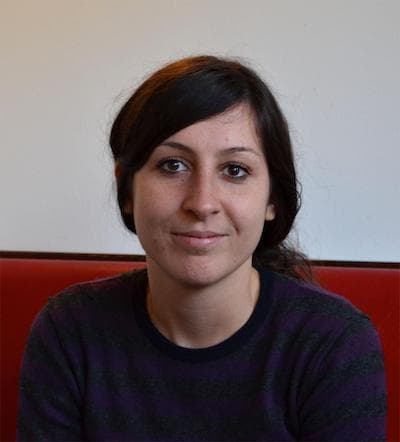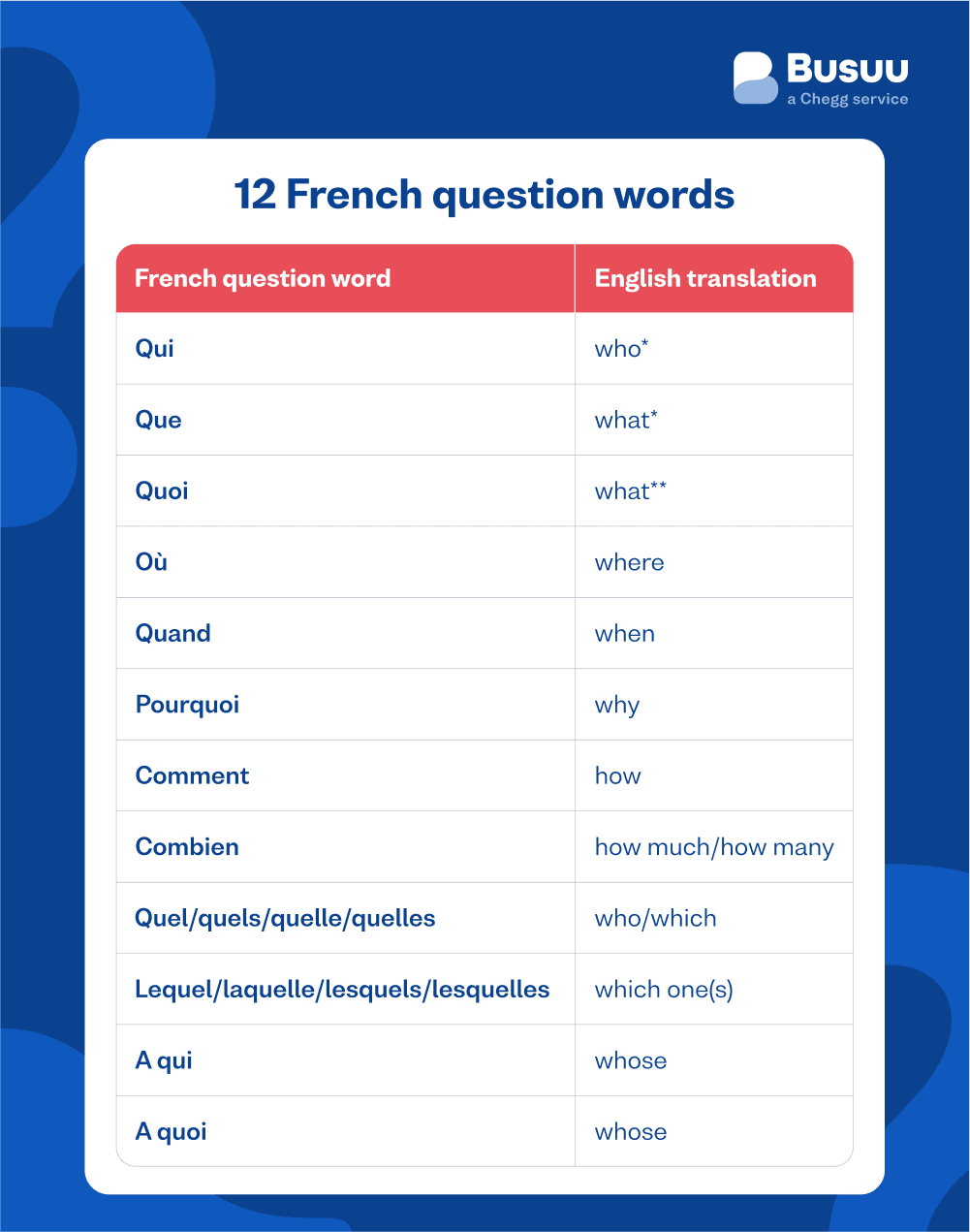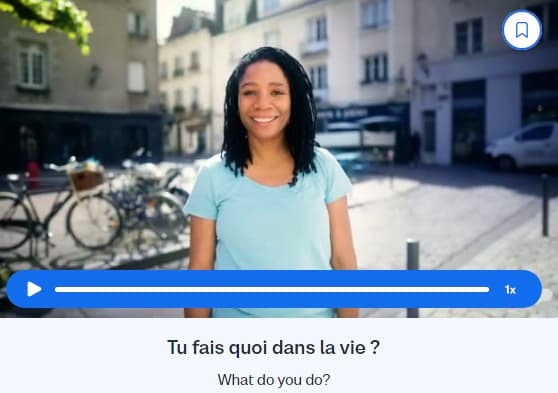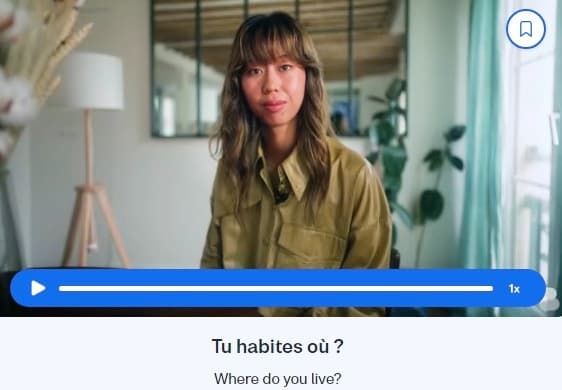I want to learn...
Author:

Laura Pennacchietti
If you want to learn to speak French, it’s important to master the French question words.
After all, when you’re learning a new language, you need to be able to ask questions – otherwise, you could end up lost in Paris, unsure where the bathroom is, unable to order a sandwich, and to make matters worse, a pretty boring conversationalist. That’s no way to live!
Fortunately, you’ve come to the right place. This guide covers it all, from the major question words to how to form a question to how to announce that you have a question in French.
Ready? Let’s get started.
The 12 Primary French question words
Question words are the words like “why” and “where” that can turn a sentence into a question. They're interrogative pronouns, adverbs, and adjectives, and usually show up at the beginning of a question. The good news is, French has essentially the same question words as English, in terms of concepts, so it’s mostly a question (no pun intended) of learning the direct translations.
The major French question words are:
● Qui (who*)
● Que (what*)
● Quoi (what)
● Où (where)
● Quand (when)
● Pourquoi (why)
● Comment (how)
● Combien (how much/how many)
● Quel/quels/quelle/quelles (who/which)
● Lequel/laquelle/lesquels/lesquelles (which one(s))
● À qui (whose)
● À quoi (of what)

Worth noting: While qui is often translated as “who,” it’s actually a little more complicated than that, because qui and que are both something called relative pronouns. You can get into the nitty-gritty of qui versus que, but for the purposes of this guide, we’ll be focusing on their use when acting as question words, where they typically translate to “who” and “what,” respectively.
How to say “I have a question” in French
Before we start asking questions, here’s how you announce that you have one, just in case the need arises. It’s simple to say “I have a question” in French:
“J’ai une question.”
J’ai– I have une– a (féminin) question– question
Easy, right?
French Question Words Explained
Qui (who)
Pronunciation: Ki (like “key”)
When it comes to putting questions together, qui is what’s called an interrogative pronoun meaning who or whom. It can also be used to follow the prepositions avec, pour, à, and de in a question.
Qui sera là? – Who will be there?
Avec qui va-t-il à Paris? – Who is he going to Paris with?
By the way: if you need a little help mastering your pronunciation, you can check out our French pronunciation tips from one of our French experts.
Que (what)
Pronunciation: Keuh (“euh” like the u in “murder” if you stopped before the r)
Que is another interrogative pronoun, but instead of standing in (typically) for a person, it stands in for an object. We use it just like we use “what” in English. It’s also used to mean “what” in the common interrogative phrase qu’est que (and similar question forms), which we’ll cover in the next section.
Worth noting: While the other French question words don’t contract, que always contracts to qu’ when paired with a word that starts with a vowel. For that reason, with certain verbs, it simply sounds more natural to use qu’est-ce que rather than que on its own. Qu’est-ce que is also much less formal than the inversion, no matter what letter the verb starts with, so it’s often preferable!
Que fais-tu ?– What are you doing?
Qu’est-ce que c’est ?– What is it?
Qu’est-ce qu’il écrit ?– What is he writing?
Quoi (what)
Pronunciation: Kwah
Quoi is basically a form of que – it means “what” – but it’s used after a preposition or when put at the end of a sentence to ask a casual question. When used as an interrogative pronoun, que usually appears at the beginning of questions, while quoi is usually used anywhere else in the sentence (except in slangy phrases like quoi de neuf? ).
C’est quoi ?– What is it?
À quoi penses-tu ?– What are you thinking about? (formal)
Tu penses à quoi ?– What are you thinking about? (informal)
Quoi de neuf ?– What’s new?
Où (where)
Pronunciation: Ooh
Où is, simply enough, the French word for “where”, indicating place. You can use it at the beginning or the end of a question. It can also be used outside of questions to simply say “where,” as in, “the street where I live” –la rue où j’habite.
Où est ta voiture ?– Where is your car?
Où est-ce qu’ils mangent ?– Where do they eat?
Le restaurant se trouve où ?– Where is the restaurant? (formal)
Il est où le restaurant ?– Where is the restaurant? (informal)
Quand (when)
Pronunciation: Kahn (just barely saying the n, stopping your tongue before it hits the roof of your mouth)
Qu and is used to say “when” in French. It can be used, like où, to form a question or to say the word “when” in a sentence. As with all other question words, it can be (and frequently is) paired with est-ce que.
Quand partez-vous ?– When do you (all) leave?
Quand est-ce qu’elle arrive ?– When does she arrive?
Pourquoi (why)
Pronunciation: Poor-kwah (por as in “to pour water”)
Pourquoi is the French word for why, used to ask about cause or reason. Outside of a question, it also means “why,” as in, “tell me why you came here” –dis-moi pourquoi tu es venu ici.
Pourquoi as-tu apporté un parapluie ?– Why did you bring an umbrella?
Pourquoi est-ce qu’elle rit ?– Why is she laughing?
Comment (how)
Pronunciation: Kum-ahn (“um” as in “umbrella,” “ahn” just barely saying the n, stopping your tongue before it hits the roof of your mouth)
Comment is French for “how”, meaning it can ask about method and means or status – for example, “how is the baby?” (status), or “how did the cow end up on the roof?” (method/means).
Comment ça va ?– How are you?
Comment est-ce que cette pizza est arrivée ici ?– How did this pizza get here?
Combien (how much/how many)
Pronunciation: Com-bee-en (“com” as in “communicate”, “en” as in “enter,” but just barely saying the n, stopping your tongue before it hits the roof of your mouth)
Combien is used in French to ask both “how much” and “how many”. Importantly, when combien is used before a noun, it is always paired with de.
Combien coûte la jupe ?– How much does the skirt cost?
Combien de personnes viennent ?– How many people are coming?
Quel/quels/quelle/quelles (who/which)
Pronunciation: Kell
When we want to ask which of something, broadly, we use quel. This breaks down as quel form masculine singular nouns, quels for masculine plural (or plural mixed gender) nouns, quelle for feminine singular nouns, and quelles for feminine plural nouns. This is different from lequel and laquelle in that it’s less specific/immediate –lequel is used to look at a group of something and say “which one (of these)”, while quel is “which” more broadly.
Quelles chaussettes aimez-vous ?– Which socks do you like?
Tu as acheté quel chapeau ?– Which hat did you buy?
Quels fromages est-ce que vous aimez ?– Which cheeses do you (all) like?
Lequel, laquelle (which one)
Pronunciation: Leuh-kell, lah-kell
Lequel and laquelle also mean which, but, as described above, they specifically ask “Which one?” Similarly, lesquels and lesquelles are the plurals, meaning “Which ones?” These words can also refer back to something previously mentioned, as in “Here are our pastries. Which one do you want?” –Voici nos pâtisseries. Tu veux lesquelles?
Lequel est votre sac à main ?– Which one is your purse?
Laquelle de ces chansons aimes-tu ?– Which of these songs do you like?
À qui (whose) and à quoi (of what)
Pronunciation: Ah ki (key), ah kwah
Lastly, we have à qui and à quoi. Now that you know what qui and quoi are, this should be pretty easy. À is a preposition that can, depending on context, mean to, in, at, with, by, upon, or of, so à qui means “whose” or “to whom” and à quoi means, loosely, “of what”. While “to whom” and “of what” sound pretty formal in English, in French, these are pretty common phrases and not nearly as stiff sounding.
À qui est ce manteau ?– Whose coat is this?
À qui écris-tu ?– To whom are you writing?
À quoi penses-tu ?– What are you thinking?
Il s’attend à quoi ?– What is he expecting?
Forming a question in French
Now that we know the words, let’s take a closer look at how we use them, and other ways to ask questions. After all, there are several different ways to pose a question in French.
Est-ce que
One of the clearest ways to ask a question in French is to add est-ce que (pronounced like “ess keuh”) onto your question word. A lot of learners find this tricky because it doesn’t really translate into English. Literally, it means “is it that…”, but functionally what it does is turn a sentence into a question for you in a more casual, natural way (versus the slightly more formal inversion, which we’ll look at next). That means, to form a question with est-ce que, you can add a question word plus est-ce que to the start of a sentence – or simply use est-ce que as a question word on its own.
For example:
Est-ce que tu as acheté du pain ?
Literally translated: Is it that you bought bread?
Functionally translated: Did you buy bread?
Où est-ce qu’il travaille?
Literally translated: Where is it that he works?
Functionally translated: Where does he work?
Notice that, with the addition of est-ce que, instead of saying, for example, as-tu acheté du pain?, with the inversion, we can simply say tu as acheté du pain.
The good news is that, while it might be confusing to think about, once you see it in action and get a feel for it, it’s really fairly simple to start using est-ce que in French conversation.
Here are all the variations of questions formed with est-ce que, with their meanings and examples.
Est-ce que questions
| Phrase | Meaning | Example | Translation |
|---|---|---|---|
| Est-ce que…? | Is (it that)…? | Est-ce que ton père est là ? | Is your father there? |
| Qu’est-ce que…? | What (is it that)…? | Qu’est-ce que tu as acheté ? | What did you buy? |
| Qui est-ce que…? | Who (is it that)…? | Qui est-ce que vous avez rencontré ? | Who did you (all) run into? |
| Qui est-ce qui…? | Who (of you is it that)…? | Qui est-ce qui veut de la glace ? | Who wants ice cream? |
| Quand est-ce que…? | When (is it that)…? | Quand est-ce que la boulangerie ouvre ? | When does the bakery open? |
| Où est-ce que…? | Where (is it that)…? | Où est-ce que tu chantes ? | Where do you sing? |
| Pourquoi est-ce que…? | Why (is it that)…? | Pourquoi est-ce qu’il n'est pas là ? | Why isn’t he there? |
| Comment est-ce que…? | How (is it that)…? | Comment est-ce que la vache est arrivée sur le toit ? | How did the cow get on the roof? |
| Combien est-ce que…? | How many (is it that)…? | Combien est-ce que nous en avons vendu ? | How many have we sold? |
| Quel/quels/quelle/quelles est-ce que…? | Which (is it that)…? | Quelles chaussures est-ce qu’il a choisi ? | Which shoes did he choose? |
| Lequel/laquelle/lesquels/lesquelles est-ce que…? | Which one (is it that)…? | Lequel est-ce que tu veux manger ? | Which one do you want to eat? |
| À qui est-ce que…? | Whose/Who/Of whom (is it that)…? | À qui est-ce qu’elle téléphone ? | Who is she calling? |
| À quoi est-ce que…? | Of what (is it that)…? | À quoi est-ce que tu penses? | What are you thinking of? |
Inversion
This is the most formal way to ask a question in French. It’s done simply starting with a question word, then inverting the word order you’d typically use to form a sentence. It works just like the most common way to ask English questions, so it should be pretty easy for English speakers to master.
Qui est ton professeur ? – Who is your teacher?
Ma professeure est Maria. – My teacher is Maria.
Où est Jacques ? – Where is Jacques?
Jacques est ici. – Jacques is here.
Que manges-tu ? – What are you eating?
Je mange une pomme. – I’m eating an apple.
Comment est-il venu ? – How did he come?
Il est venu en avion. – He came by plane.
Worth noting: While inversion is certainly in use in the French language, depending on context and what you’re trying to say, it can sound a little stiff. As with many things in French, if something feels awkward to say, it might be worth rephrasing – but this is nonetheless a useful form to know when learning to pose questions.
Question word at the end
A more casual way to form a question that’s common in day-to-day French speech is adding your question word at the end of your sentence/question. Essentially, where the object or answer to the question would go, you simply pop in the question word instead.
Here are a few examples:
Tu penses à quoi ? What are you thinking about?
L’école est où ? Where is the school?
And an exception: This structure can’t be used with qui and quoi, instead we say c’est qui and c’est quoi. For example:
C’est quoi ça ? What is that?
C'est qui ton acteur préféré ? Who's your favorite actor?
Question mark only (intonation)
Lastly, just like in casual English, you can ask a question in French simply with your tone (or a question mark, in writing). This is primarily for casual conversation and dialogue, but it’s an easy way to pose a question naturally and informally.
J'ai dit ça ?– I said that?
Tu rentres chez toi ?– You’re going home?
Il a mangé un lama ?!– He ate a llama?!
AUTHOR

Laura Pennacchietti
Newlanguages


